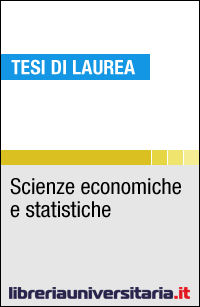
Underground economy: fiscal morality, evidence from Microdata
- Tipologia:
Tesi di Laurea di secondo livello / magistrale
- Anno accademico:
2008/2009
- Relatore:
- Claudio Lucifora
- Facoltà:
Economia
- Corso:
Economia Aziendale
- Cattedra:
Economia del lavoro
- Lingua:
- Inglese
- Pagine:
- 145
- Formato:
- Protezione:
- DRM Adobe
- Dimensione:
- 2.01 Mb
Descrizione Underground economy: fiscal morality, evidence from Microdata
Today the informal sector plays an important role in every country, from the transition countries to the developing ones, but also for high income economies. Much research has been conducted in order to estimate the size and the development of the shadow economy of several countries. However, the literature has focused mainly on measurement issues, partially setting aside the theoretical assessment of the determinant factors of the shadow economy. Our work has focused on the italian case and is based on the Bank of Italy's survey on household income and wealth (SHIW) of 2004. Our aim is firstly to provide an overview of the phenomenon of the black economy in Italy and then perform an empirical analysis. In particular, we will estimate the black economy of the interviewees and then we will conduct some analyses to verify the role of several variables in their decisions on the underground economy. In particular, we will select from the survey variables concerning individuals' personal, professional and moral characteristics. We will focus our attention on the MIMIC method, because of its characteristics: indeed, this model allows analyzing the weight of the different considered variables on the size of the informal economy. Moreover, the technique of linear regression will be used in order to assess the role of these selected variables in explaining the level of the shadow economy. We will verify if the size of the underground economy will be higher for those interviewees who have a lower level of education, for the self-employed workers, for those living in southern regions and in particular if subjects with a more pronounced sense of ethics and fiscal morality will be those who have less black economy. In order to analyze individuals' fiscal morality we will use the monographic section about their civic sense, included in the SHIW of 2004. The work is organized as follows: in the first chapter a general view of the phenomenon of the underground economy is given, with particular attention to the Italian situation: definitions of the phenomenon, the size and the features of Italian hidden economy and the main causes of the shadow economy. The second chapter consists of a comprehensive review of the MIMIC model: first, an analysis of the concept of "complexity”, then the specification and the identification of the model and, finally, a description of its advantages and its disadvantages. The third chapter is what might be defined review of the empirical literature and we will go through the most relevant contributions offered by research: in particular, we will review, and we will analyze, the existing literature concerning the estimation of the size of the shadow economy, the main causes determining the hidden economy, the role of tax morale and the relationship among shadow economy and schooling achievement. The fourth chapter consists of a description of the Bank of Italy's survey on household income and wealth of 2004 with its results: we will review the most relevant results of the survey and we will give a look to the monographic section about fiscal morality and to its main results. Then we will describe the empirical method we will use to conduct our analyses: the technique of linear regression. The fifth and final chapter contains the descriptive statistics and the empirical analyses: in particular, after the presentation of descriptive statistics, we will proceed to the determination of a proxy of the informal economy (first step) and then we will use that proxy to analyze the interviewees' hidden economy and the variables (personal, professional and ethical) that most influence the decisions of the individuals regarding the black economy (second step). Finally, we will conduct a disaggregate analysis in order to evaluate if, and how, the differences between morality, civic sense and confidence in institutions of different categories of individuals affect differently their shadow economy. Oggi l'economia sommersa svolge un ruolo importante in tutti i Paesi, dai Paesi in transizione a quelli in via di sviluppo, ma anche per le economie ad alto reddito. Molta ricerca è stata condotta al fine di stimare le dimensioni e lo sviluppo dell'economia sommersa di vari Paesi. Tuttavia, la letteratura si è concentrata principalmente sulle problematiche relative alla misurazione, in particolare alla valutazione teorica dei fattori determinanti dell'economia sommersa. Il nostro lavoro si concentra sul caso italiano e si basa sui risultati dell'indagine condotta dalla Banca d'Italia sui redditi e sulla ricchezza delle famiglie italiane del 2004 (il C.D. SHIW). Il nostro obiettivo è, in primo luogo, quello di fornire una panoramica del fenomeno dell'economia sommersa in Italia e, quindi, eseguire un'analisi empirica. In particolare, valuteremo il lavoro nero degli intervistati.


